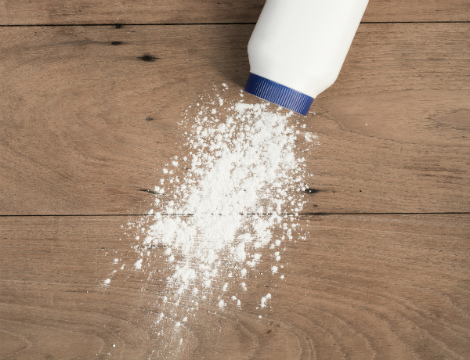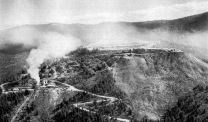Colgate-Palmolive Settles Claim Over Asbestos in Talc
Legislation & LitigationWritten by Matt Mauney | Edited By Walter Pacheco

Consumer products giant Colgate-Palmolive once again is paying for the alleged link between the company’s Cashmere Bouquet talcum powder and deadly asbestos exposure.
The New York-based company agreed to settle a lawsuit claiming a Pennsylvania woman developed mesothelioma after using the talcum powder product for more than 20 years.
Colgate-Palmolive avoided a trial in a New Jersey state court with the undisclosed settlement Oct. 30, according to court filings.
Plaintiff Carol Schoeniger alleged the company failed to warn her of risks associated with using Cashmere Bouquet, claiming inhaling the asbestos-contaminated talc product led to her cancer.
The case is the latest in the ongoing saga of talc users accusing manufacturers that their products may pose health risks.
Colgate-Palmolive currently faces more than 170 cases claiming the company sold asbestos-laced talcum powder. The company has resolved 43 asbestos-in-talc cases so far this year, according to Bloomberg.
Generations of Americans grew up with talcum powder in their homes. Colgate-Palmolive manufactured Cashmere Bouquet from 1871 to 1985 and continued to market it until 1995.
Talc is still sold and used today in many products, coveted for its ability to absorb moisture while improving textural feel.
However, reports show some talc products — especially those manufactured before the mid-1970s — contained traces of asbestos dust, a result of the two minerals often occurring naturally near each other.
Inhaling or ingesting asbestos fibers can lead to serious health conditions, including asbestosis, lung cancer and mesothelioma. The latency period for these diseases is typically decades, meaning people exposed to asbestos-contaminated talc products in the 1960s and 1970s may only just now develop symptoms.
Judith Winkel Case Sets Precedent
A California jury awarded Judith Winkel $13 million in 2015 over her mesothelioma claim tied to Cashmere Bouquet.
The verdict was the first against Colgate-Palmolive for asbestos exposure from commercial talcum powder. The company and Winkel later agreed to a confidential settlement.
Cashmere Bouquet contained talc mined by Imerys Talc North America, the world’s leading talc producer. Imerys’ Yellowstone open-cast mine in Montana remains the nation’s largest talc mining operation.
“Imerys’ firm position is that talc is safe, and that position is backed by the consensus of government agencies and professional scientific organizations that have reviewed the safety of talc,’’ Gwen Myers, a spokeswoman for Imerys Talc North America, told Bloomberg in an emailed statement.
Colgate-Palmolive openly rejected the verdict in Winkel’s case, citing there was a “clear absence of proof connecting any disease to our product.” The company did not immediately release a statement about Schoeniger’s settlement.
Colgate-Palmolive Files Motion with Philadelphia Court
The company has asked a judge to reconsider dismissing the first asbestos-related talc case in Philadelphia after the court rejected the testimony of two key experts for the plaintiffs.
Philadelphia Court of Common Pleas Judge Idee Fox barred the experts from testifying in October in the case of Brandt v. Colgate-Palmolive. The lawsuit alleges Sally Brandt developed mesothelioma from using asbestos-contaminated talcum powder between 1954 and 1970.
Colgate-Palmolive filed a motion for summary judgment with the court Oct. 23.
“Put simply, plaintiffs’ claim that Ms. Brandt’s rare disease was caused by her use of cosmetic talcum powder — a product used safely and effectively by millions upon millions of people for over a century — are grounded in junk science that this court has properly determined cannot reach a jury under Pennsylvania law,” Kent & McBride attorney Theresa Mullaney said in Colgate-Palmolive’s nine-page motion.
The company argues the plaintiffs relied on the expert testimony to initially overcome summary judgment.
California Appeals Court Reverses Summary Judgment
In a separate case, a California appeals court reversed summary judgment Oct. 20 in a Colgate-Palmolive asbestos lawsuit.
The three-justice panel of the California Court of Appeal, First District, Division 3, ruled the trial court made a mistake in granting Colgate-Palmolive summary judgment over allegations that Cashmere Bouquet contained asbestos and caused plaintiff Mary Lyons to develop mesothelioma. Lyons was diagnosed in October 2015.
In the unanimous decision, the appeals court decided Lyons had provided enough evidence to warrant a trial, which is pending.
“All or most of the Cashmere Bouquet that [Lyons] used almost daily for 20 years contained harmful asbestos,” Justice Stuart Pollak said in the 3-0 ruling. Pollak also noted there was no evidence Lyons had been exposed to asbestos from any other source.
Johnson & Johnson Wins Asbestos-in-Talc Lawsuit
Johnson & Johnson notched a landmark win Nov. 16 in the first trial centering on claims that the consumer goods and pharmaceutical giant’s products contained asbestos.
The Los Angeles Superior Court jury ruled in favor of Johnson & Johnson and talc supplier Imerys in the lawsuit filed by Tina Herford, who alleged she developed mesothelioma after using Johnson’s Baby Powder and Shower to Shower talc products during a 35-year span.
Herford was diagnosed with the asbestos-related cancer last year and, according to testimony in the four-week trial, has a prognosis of just a few months.
Johnson & Johnson in a statement welcomed the verdict, saying it believed recent verdicts in ovarian cancer lawsuits have “forced plaintiff attorneys to pivot to yet another baseless theory.”
While Herford’s case was the first against the company alleging asbestos-contaminated talcum powders caused mesothelioma, J&J faces more than 5,000 lawsuits by ovarian cancer victims who claim they contracted the disease from using talcum powders for feminine hygiene. In the few cases that have gone to court, the plaintiffs blame the pure talc itself — not asbestos — for their illness.
Much debate remains regarding talcum powder’s alleged link to ovarian cancer. J&J has been found liable in six ovarian cancer trials so far, but two of those verdicts — a $72 million decision in Missouri and a $417 million award in California — have been tossed out in appeals courts.
“Johnson’s Baby Powder has been around since 1894 and it does not contain asbestos or cause mesothelioma or ovarian cancer,” Johnson & Johnson officials said in a statement.






